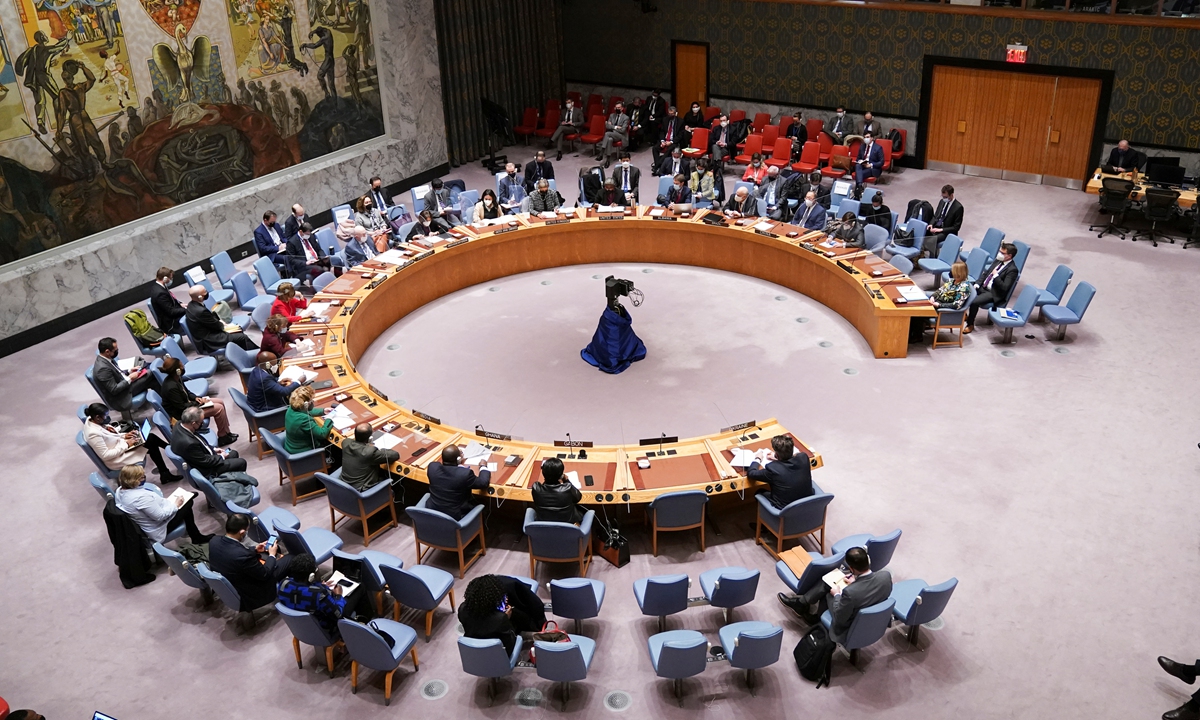India, UAE's abstention in Russia-related UNSC resolution a choice of strategic autonomy

United Nations Security Council meets after Russia recognized two breakaway regions in eastern Ukraine as independent entities, in New York City on Monday. Photo: IC
The US urged India on Monday to use its influence with Russia to protect the "rules-based international order," after some disappointment in Washington over New Delhi not coming in full and vocal support of Western views on the Ukraine crisis. Earlier, India, along with China and the UAE, abstained from voting in a UN Security Council (UNSC) resolution condemning Russia.
It's noticeable that the countries with close ties to the US like India and the United Arab Emirates (UAE) held a different stance on the Ukraine crisis. Those countries were not satisfied with the UNSC resolution and considered it inconsistent with international laws. However, they had to put a high value on the crisis in light of the current tension in Ukraine. India and the UAE, in this case, chose to abstain with a middle-of-the-road approach.
On the other hand, the two countries have embodied too much of a pro-US policy in recent years with the consequences now emerging. They are well aware of the risks of blindly following the US, especially in light of it abandoning its allies and the policy of "America First" in regards to Afghanistan, Syria and even Ukraine. As a result, they are gradually moving to a strategy of looking eastward, paying more attention to the importance of strategic autonomy.
The Ukraine crisis is special to India because of its dependence on Russian energy and the close arms trade relationship. India's purchase of Russia's S-400 missile defense systems has made the US unhappy, which threatened to sanction India. Such risks related to its pro-US policy have led India to dial back after effectively abandoning its non-alignment policy several years ago.
However, India may not be willing to give up the benefits of the pro-US policy and hopes to walk a tightrope between Russia and the US without offending either side.
India believes that the world is in an era of political confrontation between blocs, therefore, it needs to have representation in different camps in order to increase room for maneuver. As such, India has advocated a balanced diplomatic strategy and followed a course of multi-alignment so that it can gain benefits from relations with all major powers. Taking all these into consideration, India has to take a neutral stance over the Ukraine issue.
It needs to be noted that the US still wants to use India to contain and suppress China. Even if Washington is quite dissatisfied with India's abstention on the US-sponsored UNSC resolution vis-a-via Russia, it will have to tolerate the abstention. Although India has shown some strategic autonomy and independence concerning the Russia-Ukraine issue, it has distanced itself too far from the Quad. This is a major shift for India in its foreign policy over the past half-century. New Delhi may fine-tune its policies, but it won't completely change its course. India has abandoned its traditional non-alignment policy, and the US is using any means to rope it in. There isn't much room left for India's strategic autonomy.
In recent years, especially after the 9/11 attacks, the US has prioritized its own interests, abandoning allies and bringing chaos and turmoil to various regions of the world. Such examples are numerous, which has put its allies and partners on high alert and made them increasingly aware of the risks of being tied to the US' chariot.
Therefore, countries like the UAE are increasingly aware of the need to strengthen their own strategic autonomy, rethink their relationship with the US, and avoid becoming a pawn for major power confrontation.
It can be seen from the UAE's abstention this time that some countries are looking eastward, and trying to re-strength ties with countries like China, Russia and India. With the turmoil in global oil and energy market and the focus of US foreign policy shifting from the Middle East to China and Russia, Gulf states like the UAE have come to realize that they must invest in Asia. Being tied to the US will bring trouble and chaos to the country, and pressurize them to take sides.
This also gives some warning to the secessionist forces on the island of Taiwan. The DPP authority should see from this Ukraine crisis how the US uses and manipulates its so-called allies and partners, and abandons them without hesitation. The US stated from the beginning that it would not send troops. It set the fire, but did not want to put it out. If the Taiwan authority is wise, it should return to the one-China principle and resolve the issue of reunification through peaceful cross-Straits negotiations, rather than colluding with foreign forces. This is also the best choice for Taiwan's own development.
The author is head of the Department for Asia-Pacific Studies at China Institute of International Studies. opinion@globaltimes.com.cn
